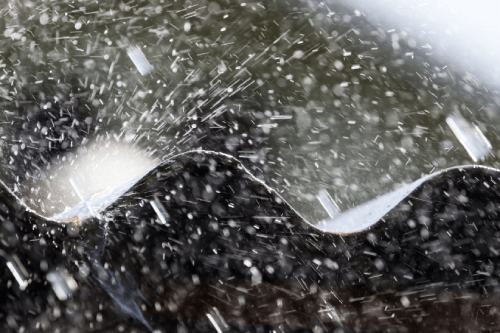
San Antonio, TX, sometimes receives sudden and intense heavy rains. A series of training storms can cause flooding, as can other severe weather events. While you can’t control the weather, you can control the condition of your home’s plumbing system. Regular maintenance can prevent a lot of problems, and awareness of potential issues may give you time to act before a disaster happens. Here are some of the possible ways that too much rain can affect your plumbing system.
Flooding From Poor Property Drainage
If your property is flat, heavy rain may pool on it. The rainwater may pool around the area where your gutters and downspouts drain, so the water has nowhere to go. The heavy rainwater may also saturate the soil, preventing water from your sump pump from moving away from your home. The floodwater could penetrate your home’s slab, crawl space or basement foundation, resulting in a flooded home.
Leaking Foundation From Poor Grading of Soil
Many homes have improper grading of soil. The slope of the soil needs to be 1 inch down per 12 inches away from your home. If the slope is less than this, rainwater could actually flow toward your home. The pressure of rainwater against your home’s foundation could cause cracking, bowing or shifting. It could also cause plumbing openings, flues and vents to be flooded. Water could come in through those plumbing openings, electrical outlets or small cracks, leading to a dangerous situation.
Water Penetration From Debris in Rain Gutters
During a storm, leaves, sticks and other debris can clog gutters. Forgetting to clean out the rain gutters once every month or two can also cause debris to accumulate. If the rain gutters are obstructed, the water can’t flow away from your home. Instead, it will take the path of least resistance. In many cases, it will back up and seep through your roof, causing a roof leak. It could also soak through the walls of your home. The rain could also overflow the gutters, landing around your home’s foundation and causing a plumbing problem where the pipes enter your home.
Downspout or Gutter Overflow From Improper Slope
If the downspouts or gutters are not mounted properly, heavy rainfall could cause them to overflow or back up. Over time, rusted anchors or fasteners could cause the gutters to develop an improper slope. When the rainwater in the gutters or downspouts can’t flow away from the home and to the street or wastewater system, it could flood the home. If the rainwater from the gutters and downspouts is directed to a wastewater system that is already overflowing, this could cause the wastewater to back up into the home.
Debris Blocking Main Sewer Drain
During a heavy rainstorm, debris could block your main sewer drain. Sticks, leaves, trash and other items could be washed into the drain. This will prevent the wastewater from your home from reaching the city’s sewer line. The raw sewage could back up into your home’s plumbing fixtures or through a floor drain, resulting in a flood contaminated by human waste. One way to prevent this from happening is to schedule preventive sewer drain maintenance. Hydro jetting and augering are two options for keeping your home’s main sewer line clean.
Shifting of Underground Pipes from Flood Water
Floodwater from heavy rain could cause underground pipes to shift. As soils become saturated, they expand. The heavy, wet soil exerts a lot of pressure, and the expansion of soil particles pushes on buried water lines and sewer lines. If your water line or sewer pipe shifts, it could break. A broken water line could flood your home when the high-pressure water penetrates the foundation. A broken sewer line would cause the sewage to seep into your home, and it could back up through your plumbing fixtures.
Sewer Line Obstructed By Tree Roots
Heavy rains are a boon for trees. Their roots thrive in moist conditions. Rapidly growing tree roots can penetrate water and sewer lines. They just need a small area of corrosion or a slight offset to get inside the pipe. Once tree roots are inside a sewer line, they will grow thick and obstruct the pipe. The roots feed on the nutrients in sewage. A blocked sewer line will cause a flood of wastewater and raw sewage into your home.
Collapse of Sewer Drain
A sewer drain that is overwhelmed by rainwater and wastewater could collapse. If the pipe is already compromised by an offset, tree roots or corrosion, this is even more likely. A weakened pipe can’t withstand the pressure exerted by saturated soil. If the sewer pipe collapses, the wastewater and sewage from your home will have nowhere to go. It will back up into your plumbing fixtures. Floodwater from the outdoors could also seep into the collapsed pipe and get into your home.
Backflow of Water From Municipal Sewer
Heavy rain could cause a major problem with the municipal wastewater and storm drains. If those drainage systems are overwhelmed, the overflow of water could back up into the lateral lines. Those lateral lines connect to your home. If you don’t have a backflow preventer installed at the connection between your home and the lateral line, the overflow of water could flood your house. A backflow preventer device can be installed by a licensed plumber at any time.
Cracked Water or Sewer Pipe From Excessive Pressure
Excessive pressure from saturated soil could cause your home’s water or sewer pipe to crack. If the pipe cracks, it could flood your home. Although you can’t control soil movement, you can be proactive in making sure your home’s soil is graded away from the foundation. If your water and sewer lines are more than 50 years old, consider a preemptive replacement or an annual video inspection to check on their conditions.
Collapse of Water Pipe From Flood Water
Floodwater could collapse your water pipe. The weight of the excess water may be more than your water line can handle. Consider replacing an old, weak water line with a new, sturdy one. Most water lines have a lifespan of 50 years. When replacing a water line, consider having it buried more than three feet below the surface. This will reduce the amount of water penetration. A deeper burial of the waterline also reduces the effects of freeze and thaw cycles and frost penetration.
Poor Water Quality
Heavy rains may cause poor water quality. This is more common in areas where the water reservoirs are open to the air. Flooding rains may wash debris into the water and increase turbidity. You might notice that the water coming from your taps is cloudy or has a more earthy taste. It may also have more of an odor than normal.
Beyer Plumbing is the trusted provider of emergency plumbing repairs in San Antonio. Homeowners also turn to us for pipe and fixture installation, plumbing maintenance, water heaters, water quality systems and water purification systems. If you’re a business owner in San Antonio or the surrounding area, you can also count on us for reliable commercial plumbing services. For additional details about how too much rain can cause plumbing problems, get in touch with us today.


